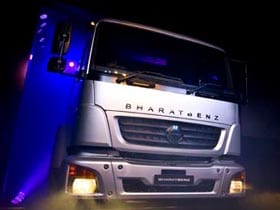
Trucking Along on Indian Roads
V.R.V. Sriprasad, president, marketing & sales, after sales, Daimler India Commercial Vehicles, tells Forbes India that customers will see a significant improvement in reliability with Daimler’s trucks
Commercial vehicles in India have to go through a lot of abuse in terms of overloading or adulterated fuel. How does an MNC like Daimler look at that?
I wouldn’t agree with the statement that a customer abuses the truck. I think when a guy buys the truck, he does so to make optimal use of it. What we see as overloading today, it is a function of the whole ecosystem and it has nothing to do with that customer and driver alone. A lot of things have to be conducive if you have to move to an ideal situation. You have to understand the whole situation and then decide what are the steps that need to be taken to move to something better. In that, nobody should lose out.
From our side, we are very clear that our trucks will be providing reliability whether he uses it normally or what you say in abusive condition. He will be able to see a significant improvement in reliability with our trucks. So, that should give him better returns and lower cost of ownership. I am not on a missionary zeal to change the entire ecosystem here. I am focussed on my customer and what I can do in products and services to make sure that we make him more successful. As of now, we are focussing on only this missionary zeal and nothing else.
Your competitors’ big selling point is large network and big discounts. How will a new entrant like you compete?
Network, yes, because if you are selling trucks, then customers could use them across the length and breadth of the country. We have come a long way from 30-40 years ago where trucks would require every 5,000 kms oil change and all. Today, every company has moved to 30,000-km oil change. And reliability has also improved. However, for a customer, when a truck is moving on the road and every one hour he sees a dealership of the brand he owns on the highway, that gives him a lot of confidence. We understand that we need to be present across India to take care of any unforeseen event. We have contracted dealerships for three years in 70 locations and we are continuing to add more dealers to our kitty. By the time all our 17 platforms are launched, we will have 100 [locations], plus three years dealerships across India.

But does a new entrant really break into the stronghold of what you will call a market which has two large players like Tata Motors and Ashok Leyland?
How do we explain that we are not new? Daimler is not new to trucks. I am not new to the trucking industry. It is just so that all the experience that Daimler has had in the 120 years and having seen many markets like India develop and how they have moved, those experiences are valuable. Those are the things that we are factoring in, learning from past experiences. Most of us here are from the Indian trucking industry who understand the nuances of the local market. So, the marriage of the two is a very, very potent combination which will be reflected in our products and services. You will see the difference.
What works for a trucker? How does he make a decision on what to buy?
What works for him is the total cost of ownership. A large constituent, almost half of it, is cost of fuel. Fuel efficiency is one thing which will directly be recognised and result in a savings for him. [Our] R&D had this as a brief from us that our fuel efficiency has to be significantly better than competition. This is something that right from the first trip, the owner will start realising. He doesn’t have to wait for a couple of years to see that. On quality, which might not be totally related to total cost of ownership, we will be much better. Reliability, which is what he would need to spend over a lifetime, will be much better. That the truck is earning for him makes a big difference. It is not about spending. That’s a small part. It is about how much more time the truck has on the road, and there we have built reliability on every aggregate.





